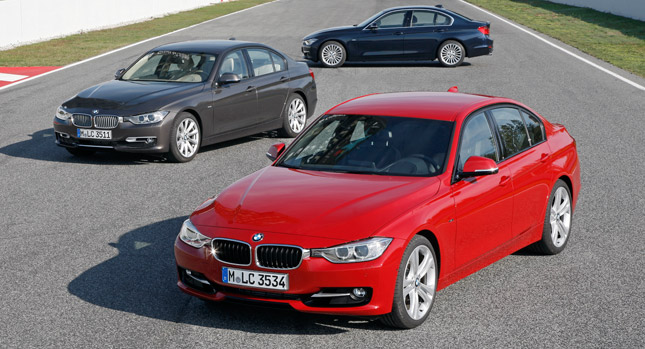The newly launched F30 2012 BMW 3-Series sedan has just welcomed three new models into its range in Europe with the presentation of one petrol version, the 320i, and a pair of diesel variants, the 316d and 318d.
The 320i is the second four-cylinder turbocharged petrol model after the 328i. In fact, it shares a detuned version of the latter’s 2.0-liter inline-four with direct injection, twin-scroll turbocharging, double-Vanos variable camshaft timing and Valvetronic variable valve timing technologies.
In the 320i, output has been lowered from the 328i’s 240HP and 350 Nm to 184HP at 5,000 rpm, and 270 Nm (199 lb-ft) from 1,250 rpm. With the standard 6-speed manual, the 320i sedan accelerates in 7.3 seconds from standstill to 100 km/h (62mph), 0.9 seconds faster than its predecessor model.
Even though it’s faster, it’s also more fuel efficient returning a combined 5.9 lt/100km (39.9mpg US or 47.9mpg UK) on the EU test cycle, thus undercutting its predecessor by 0.5 lt/100 km or about seven per cent. As an option, BMW offers an 8-speed automatic transmission.
Moving on to the diesel range, the new entry-level 316d and 318d use the same 2.0-liter turbocharged four-cylinder diesel engine from the predecessor model.
In the 316d, it delivers 116-horses and a maximum torque of 260 Nm (191 lb-ft) between 1,750 and 2,500 rpm propelling the sedan from zero to 100 km/h in 10.9 seconds (8sp automatic: 11.3 sec), and achieving a top speed of 202 km/h (126mph).
The 316d’s average fuel consumption is 4.4 lt/100km or 53.5mpg US / 64.2mpg UK (8sp automatic: 4.5 l/100 km), with CO2 emissions of 115 and 116 g/km respectively.
In the new 318d, the diesel unit produces 143-horses at 4,000 rpm with a maximum torque of 320 Nm (236 lb-ft) between 1,750 and 2,500 rpm, offering a 0-100km/h sprint time of 9.1 seconds (auto: 9.3 seconds) and a top speed of 210km/h (130mph).
BMW says it consumes on average 4.5 lt/100km (52.3mpg US or 62.8mpg UK) with CO2 emissions of 117 g/km in both transmission versions.
PHOTO GALLERY










